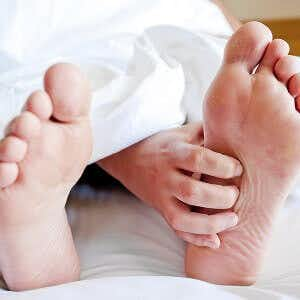
Neuropathy is one of those words that tells you very little. Broken down it stands for nerve (neuro) and disease (pathy). But nerve pain doesn’t tell you much about the cause of the distress.
When nerve problems occur in legs or hands doctors refer to the problem as peripheral neuropathy. Again, this is not a very helpful description because it is way to broad. Not infrequently we get questions about diabetic peripheral neuropathy, which is a direct consequence of diabetes and the damage to nerves, especially in the feet.
Sometimes, though, there is no obvious cause for the symptoms of peripheral neuropathy.
Symptoms of Peripheral Neuropathy:
- Numbness and/or tingling in feet or hands
- Burning sensation in feet. This may occur as a pins and needles like sensation or an unbearable stabbing pain
- Sensitivity to touch which can even the slightest pressure uncomfortable
- Loss of sensation, so that people cannot feel their feet or the ground under them. This can lead to unsteadiness
Causes of Nerve Pain:
Injury: an accident or injury can damage nerves. Surgery may also lead to neuropathy.
Diabetes: blood sugar elevation over time can damage nerves.
Autoimmune disease: Lupus, rheumatoid arthritis, Sjogren’s syndrome, and MS are just some of the conditions that can cause neuropathy.
Kidney Disease: When kidneys cannot remove toxins efficiently from the body, nerve damage can result.
Vitamin Deficiencies: When B vitamins are too low (especially B12, B1 and B6) people can experience peripheral neuropathy.
Drug-induced neuropathy: The list is long and includes chemotherapy agents used to treat cancer (cisplatin, docetaxel, paclitaxel, vincristine, etc), medications for autoimmune conditions such as infliximab (Remicade) and etanercept (Enbrel); Heart medicine like amiodarone; antibiotics such as fluoroquinolones (ciprofloxacin, levofloxacin) and statin-type cholesterol-lowering medications (atorvastatin, pravastatin, simvastatin, etc). This is just the tip of the iceberg. Anyone experiencing symptoms of peripheral neuropathy should ask his health professional if a medication could be causing the problem!
Natural treatment of Peripheral Neuropathy:
Q. Are there any natural approaches for the pain of neuropathy?
A. There are a few possibilities. One is alpha lipoic acid. A meta-analysis of 15 randomized controlled trials demonstrated that it is safe and probably effective for treating diabetic nerve pain (European Journal of Endocrinology, Oct. 2012).
The other possibility is benfotiamine, a synthetic derivative of vitamin B1 (Pharmacological Research, June, 2010). It has been investigated as a treatment for diabetic neuropathy (Current Clinical Pharmacology, Nov. 2011).
One reader shared this experience:
“Benfotiamine has absolutely stopped the sharp electrical pains in my feet. It has also considerably relieved the tenderness and pain on the skin of my feet. Nothing else helped me.
“I started with 300 mg a day–150 mg in the morning and 150 mg in the evening. I have reduced that now to 75 mg am and 150 mg pm.”
You will find a discussion and other comments on benfotiamine here.
An article in the New England Journal of Medicine (April 14, 2016) discusses a case of diabetic neuropathy. The physician suggests a number of medications may be helpful including gabapentin or tricyclic antidepressants. He goes on to suggest that:
“If the vitamin B12 level is below 450 pg per milliliter, supplementation with oral methylcobalamin (2000 μg per day) could be initiated, although there are as yet no data that show that supplementation reduces neuropathy in the absence of frank deficiency. Alpha lipoic acid can be given to relieve pain (starting at a twice-daily oral dose of 300 mg), although formal studies of its use in this regard have not been conducted.”
Revised, April 28, 2016

